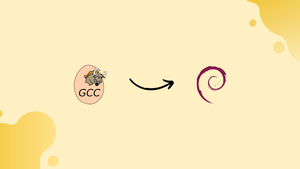Introduction
Before we start talking about how to install and use g++ on Debian, let's briefly understand - What is g++ ?
The GNU C++ compiler is a decently portable C++ optimizing compiler. The default GNU C++ compiler is provided by this dependency package. The g++ compiler is essential for compiling and running C++ programs on Debian-based systems.
This tutorial will provide instructions on how to install g++ on Debian and use it to compile and execute C++ code. We will also address a few FAQs on how to install and use g++ on Debian.
Advantages of g++ on Debian
- Efficiency: g++ produces highly optimized executable code, maximizing the performance of C++ programs.
- Portability: Once compiled, C++ programs can be run on various platforms, making g++ ideal for writing cross-platform applications.
- Powerful Features: g++ supports modern C++ standards and provides access to advanced language features, allowing for more expressive and efficient code.
- Development Ecosystem: g++ is a widely-used compiler, backed by a strong community and extensive documentation, providing a wealth of resources for developers.
- Interoperability: g++ allows for seamless integration with existing C codebases, enabling developers to leverage C and C++ together for their projects.
Install g++ Via apt-get
Run the following command to use apt-get to update the apt database.
sudo apt-get update
The following command can be used to install g++ using apt-get after refreshing the apt database:
sudo apt-get -y install g++
Install g++ Via apt
Use the command below to update the apt database.
sudo apt update
The following command can be used to install g++ using apt after refreshing the apt database:
sudo apt -y install g++
Install g++ Via aptitude
Since aptitude generally is not installed by default on Debian, installing it first may be necessary if you want to use this method. Execute the following command to update the aptitude database for apt.
sudo aptitude update
The following command will use aptitude to install g++ after updating the apt database:
sudo aptitude -y install g++
How To Uninstall g++ on Debian 10
We can use the following command to remove just the g++ package:
sudo apt-get remove g++
Uninstall g++ And Its Dependencies
The following command can be used to remove g++ and any dependencies that Debian 10 no longer requires:
sudo apt-get -y autoremove g++
Remove g++ Configurations and Data
We can use the following command to erase Debian 10s g++ configuration and data:
sudo apt-get -y purge g++
Delete g++ configuration, data, and all of its dependencies
The following command can be used to delete all the dependencies, configurations, and data associated with g++:
sudo apt-get -y autoremove --purge g++
FAQs to Install and Use g++ on Debian
How do I check if g++ is already installed on my Debian system?
Open a terminal and type g++ --version. If g++ is installed, it will display the version number; otherwise, an error message will be shown.
How do I install g++ on Debian?
Run the command sudo apt install g++ in the terminal to install g++ on Debian.
Are there any dependencies for g++ that need to be installed?
No, the g++ package includes all necessary dependencies, so running sudo apt install g++ will automatically install them.
Can I install a specific version of g++?
By default, Debian installs the latest stable version of g++. If you require a specific version, you can check the available versions using apt list g++ and install the desired version using sudo apt install g++=<version>.
What is the package name for g++ on Debian?
The package name for g++ on Debian is g++.
How do I run the compiled C++ program?
After successful compilation, run the executable file by typing ./output in the terminal, replacing output with the actual name you specified during compilation.
Can I compile multiple C++ files together using g++?
Yes, you can compile multiple C++ files together by listing all the source file names separated by spaces in the compilation command. For example, g++ file1.cpp file2.cpp -o output.
Conclusion
In this tutorial, you learnt how to install g++ on Debian 10 using several package management tools such as apt, apt-get, and aptitude.
If you have any queries or doubts, please leave them in the comment below. We'll be happy to address them.
